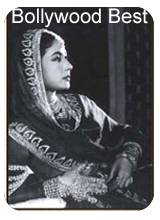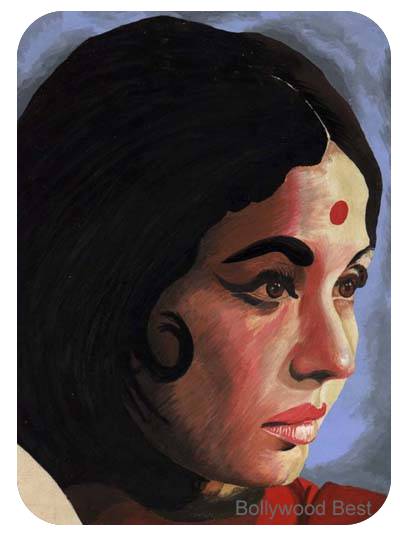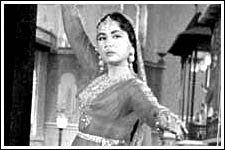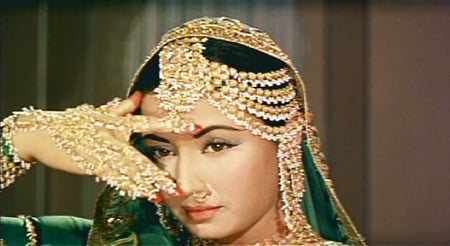


Bigg Boss 19: Daily Discussion Thread - 26th Sept 2025
DANDIYA NIGHT 26.9
Bigg Boss 19 - Daily Discussion Topic - 27th Sep 2025 - WKV
🏏T20 Asia Cup 2025: IND vs SL, Match 18, A1 vs B1 - Super 4 @Dubai🏏
DIL DOORMAT 27.9
Yeh Rishta Kya Kehlata Hai Sept 27, 2025 || EDT
Abhira master planner of breaking Arman relationships
Besharmi ki sari hadein paar karegi Abhira- Media is catching up
Sabse Nalla Kaun in gen 4
Book Talk Reading Challenge: open to volunteers
Anupamaa 26 Sept 2025 Written Update & Daily Discussions Thread
Is noina mandira post plastic surgery?
70th Filmfare Awards Nominations
CID episode 81 - 27th September
Ranbir Kapoor Birthday Celebration Thread 🎂🎂



I just came across with this article, did it ever happen or going to happen in future?
| ||
| | ||
|
 | ||||||||||||||||||||||||
 Dinesh Raheja Some films (Palki, Deedar-e-Yaar) seek to buy classic status with massive budgets and crumple under the pressure of their own pageantry. Pakeezah is lavish in its treatment of a courtesan's turbulent story, but its splendour fills the eye, stirs the senses. And it ultimately showcases the heart beating at the film's core. Pakeezah's chandelier-heavy, fountain-adorned Gulabi Mahal is draped with flimsy curtains and inhabited by statuesque women with trailing dupattas. There is nothing stark here.
* Naushad composed the theme music and is said to have significantly contributed overall after Ghulam's death. His alaap for Lata is exquisite. |

| Information On Meena Kumari | |
| Name: | Meena Kumari |
| Real Name: | Mehjabeen Bano |
| Date Of birth: | August 1, 1932 |
| Debut Film: | Sahib Bibi aur Ghulam (1962) |
| Meena Kumari's Profile |
| MEENA KUMARI, traditionally known for perfecting the role of the tragedienne in films, is actually the embodiment of the woman as Essence rather than flesh. In a career spanning three decades, she chiselled the contours of two role models and created some kind of an ideal in the mind of the viewer. The droop of her kiss curl, the anguish-laden voice never more than a sob from abject despair, the unblemished beauty made Meena Kumari the ultimate tragedy queen in Indian Cinema. This is an image to which she remained shackled for the rest of her life - the lonely sorrowful woman whose desires remain unfulfilled in a cruel world. She was born Mahjabeen Ali Bux, daughter of the Parsee theatre actor and music teacher Ali Bux and the dancer Iqbal Begum. Having hit upon hard times and living near Rooptara Studios, Ali Bux sought to get his daughters into films. Mahjabeen was renamed Baby Meena and cast in Vijay Bhatt's Leatherface (1939). Very few people know that Meena Kumari was connected to the grand Rabindranath Tagore family. Meena Kumari's grandmother, Hem Sundari Thakur (Tagore) was married into the Tagore family but after she lost her husband Rev Bill, she was compelled to give up all her rights to the family name or property by her in-laws. Her early adult work consisted of mainly mythologicals like Veer Ghatotkach (1949), Shri Ganesh Mahima (1950) and fantasies like Alladin and The Wonderful Lamp (1952). She hit the big time with Vijay Bhatt's Baiju Bawra (1952). With Baiju Bawra, the suffering Indian Woman found a new face in Meena Kumari. The heroine in the film is ever ready to negate herself for the material and spiritual advancement of the man she loves and is even willing to annihilate herself to provide him the experience of pain so that his music would be enriched! It was a strong performance and fetched her the inaugural Filmfare Award for Best Actress. She became Film Director Kamal Amrohi's second wife and with Daera (1953), Ek Hi Rasta (1956), Sharda (1957) and Dil Apna Aur Preet Parayi (1960), Meena went from strength to strength playing the suffering woman, the martyr to perfection. In Daera, her barren life and subsequent disintegration underscores the Indian Woman's lack of selfhood and remains one of the great moments of screen acting. In Sharda she gave a tour de force performance as Raj Kapoor's lover who becomes his stepmother. Unfortunately coming in the same year as Mother India, Nargis swept all the awards but the Bombay Film Journalists Association named Meena as their best actress of the year for Sharda. It is a pity that Meena was known for her tragic roles and she too chose more such roles to cultivate her image of being the great tragedienne because in the few light-hearted films she did in between like Azaad (1955), Miss Mary (1957), Shararat (1959) and Kohinoor (1960), she displayed an uninhibitedness that was refreshing to say the least. In these films, her physical movements are free and unrestrained and her dialogue delivery absolutely normal - a stark contrast to the studied mannerisms and passive postures of her tragic roles. It was tragedy however which saw Meena Kumari's greatest ever performance and immortalized her. The film was Sahib Bibi Aur Ghulam (1962). Produced by Guru Dutt, the film tells the story of Choti Bahu, the youngest bride in an aristocratic zamindar family who strives to make her errant husband return to her even at the risk of self-destruction. It is perhaps the greatest performance ever on the Indian Screen. The sequence where Choti Bahu dresses for her husband singing Piya Aiso Jiya Main is a poignant exploration of a woman's expectations and sexual desire. You cannot help but cry with her in the sequence where she pleads with her husband to stay with her and then angrily turns on him to tell him how she has prostituted her basic values and morals to please him. That year Meena made history as she garnered all the three Best Actress nominations for the Filmfare Award - For Aarti (1962), Main Chup Rahoongi (1962) and of course Sahib Bibi Aur Ghulam for which she won the award. However the common factors between the actress's life and Choti Bahu are too dramatic to be merely coincidental - The estranged marital relationship, the taking of alcohol, turning towards younger male company, the craving to be understood and loved - all elements evident in Meena Kumari's own life. Elements which were mythicized in the film world in the 1960s. While on the professional front, the emphatic success of Dil Ek Mandir (1963), Kajal (1965) and Phoor Aur Pathar (1966) kept her a top star, her marriage with Kamal Amrohi ended in 1964. Meena increasingly relied on the intimate kindness offered by younger men like Dharmendra and often dulled her senses with liquor. Her image grew in dimension as she was now widely seen as the eternal martyr. Meena spent the last years of her life playing the doomed diva. With heavy drinking she had lost her looks and she began playing character roles albeit strong ones in potboilers like Jawab (1970) and Dushman (1971). A talented poetess in her own right, she recorded a disc of her Urdu poems - I write, I recite. Thankfully her exquisite speaking voice remained intact. She came up with a strong portrayal of an old woman caught between two street gangs of frustrated, unemployed youth, whose killing finally makes them realize the futility of violence in Gulzar's directorial debut Mere Apne (1971) and realizing she had limited time left went out of her way to complete what has now become a cult classic - Pakeezah (1972). The film is a stylized, larger than life mythicization of the familiar tale of the prostitute with the heart of gold. Jointly planned by Meena and husband Amrohi in 1958, the film took 14 years to finally reach the silver screen. Filming had come to a halt when the couple split but Meena was now determined to complete it. There is grandeur in Amrohi's filmmaking - an epic magnitude of treatment. The evocative songs and the background music create the right period mood and Amrohi's eye for details brings great depth to the lavish sets. The film is helped by a stunning performance by Meena in the dual roles of the mother and daughter. Pakeezah finally released in February 1972 and opened to just a lukewarm response but after her death on 31st March 1972, the film went on to become a huge success at the box-office and has since then acquired legendary status and is regarded as her best known film. Meena Kumari's last film was Gomti ke Kinare (1972). Tanha Chand, a collection of her poems under the pseudonym Naaz was compiled by Gulzar and published after her death. Famous Movies:
|

| Meena Kumari |
|---|

| Meena Kumari |
|---|

| Meena Kumari |
|---|

| Meena Kumari |
|---|
The droop of her kiss curl, the anguish-laden voice never more than a sob from abject despair, the unblemished beauty made Meena Kumari the ultimate tragedy queen in Indian Cinema. This is an image to which she remained shackled for the rest of her life - the lonely sorrowful woman whose desires remain unfulfilled in a cruel world.
She was born Mahjabeen Ali Bux, daughter of the Parsee theatre actor and music teacher Ali Bux and the dancer Iqbal Begum. Having hit upon hard times and living near Rooptara Studios, Ali Bux sought to get his daughters into films. Mahjabeen was renamed Baby Meena and cast in Vijay Bhatt's Leatherface (1939).
Her early adult work consisted of mainly mythologicals like Veer Ghatotkach (1949), Shri Ganesh Mahima (1950) and fantasies like Alladin and The Wonderful Lamp (1952). She hit the big time with Vijay Bhatt's Baiju Bawra (1952).
With Baiju Bawra, the suffering Indian Woman found a new face in Meena Kumari. The heroine in the film is ever ready to negate herself for the material and spiritual advancement of the man she loves and is even willing to annihilate herself to provide him the experience of pain so that his music would be enriched! It was a strong performance and fetched her the inaugural Filmfare Award for Best Actress.
She became Film Director Kamal Amrohi's second wife and with Daera (1953), Ek Hi Rasta (1956), Sharda (1957) and Dil Apna Aur Preet Parayi (1960), Meena went from strength to strength playing the suffering woman, the martyr to perfection.
In Daera, her barren life and subsequent disintegration underscores the Indian Woman's lack of selfhood and remains one of the great moments of screen acting. In Sharda she gave a tour de force performance as Raj Kapoor's lover who becomes his stepmother. Unfortunately coming in the same year as Mother India, Nargis swept all the awards but the Bombay Film Journalists Association named Meena as their best actress of the year for Sharda.
It is a pity that Meena was known for her tragic roles and she too chose more such roles to cultivate her image of being the great tragedienne because in the few light-hearted films she did in between like Azaad (1955), Miss Mary (1957), Shararat (1959) and Kohinoor (1960), she displayed an uninhibitedness that was refreshing to say the least. In these films, her physical movements are free and unrestrained and her dialogue delivery absolutely normal - a stark contrast to the studied mannerisms and passive postures of her tragic roles.
It was tragedy however which saw Meena Kumari's greatest ever performance and immortalized her. The film was Sahib Bibi Aur Ghulam (1962). Produced by Guru Dutt, the film tells the story of Choti Bahu, the youngest bride in an aristocratic zamindar family who strives to make her errant husband return to her even at the risk of self-destruction. It is perhaps the greatest performance ever on the Indian Screen. The sequence where Choti Bahu dresses for her husband singing Piya Aiso Jiya Main is a poignant exploration of a woman's expectations and sexual desire. You cannot help but cry with her in the sequence where she pleads with her husband to stay with her and then angrily turns on him to tell him how she has prostituted her basic values and morals to please him.
That year Meena made history as she garnered all the three Best Actress nominations for the Filmfare Award - For Aarti (1962), Main Chup Rahoongi (1962) and of course Sahib Bibi Aur Ghulam for which she won the award. However the common factors between the actress's life and Choti Bahu are too dramatic to be merely coincidental - The estranged marital relationship, the taking of alcohol, turning towards younger male company, the craving to be understood and loved - all elements evident in Meena Kumari's own life. Elements which were mythicized in the film world in the 1960s.
While on the professional front, the emphatic success of Dil Ek Mandir (1963), Kajal (1965) and Phoor Aur Pathar (1966) kept her a top star, her marriage with Kamal Amrohi ended in 1964. Meena increasingly relied on the intimate kindness offered by younger men like Dharmendra and often dulled her senses with liquor. Her image grew in dimension as she was now widely seen as the eternal martyr.
Meena spent the last years of her life playing the doomed diva. With heavy drinking she had lost her looks and she began playing character roles albeit strong ones in potboilers like Jawab (1970) and Dushman (1971).
A talented poetess in her own right, she recorded a disc of her Urdu poems - I write, I recite. Thankfully her exquisite speaking voice remained intact.
She came up with a strong portrayal of an old woman caught between two street gangs of frustrated, unemployed youth, whose killing finally makes them realize the futility of violence in Gulzar's directorial debut Mere Apne (1971) and realizing she had limited time left went out of her way to complete what has now become a cult classic - Pakeezah (1972).
The film is a stylized, larger than life mythicization of the familiar tale of the prostitute with the heart of gold. Jointly planned by Meena and husband Amrohi in 1958, the film took 14 years to finally reach the silver screen. Filming had come to a halt when the couple split but Meena was now determined to complete it. There is grandeur in Amrohi's filmmaking - an epic magnitude of treatment. The evocative songs and the background music create the right period mood and Amrohi's eye for details brings great depth to the lavish sets. The film is helped by a stunning performance by Meena in the dual roles of the mother and daughter.
Pakeezah finally released in February 1972 and opened to just a lukewarm response but after her death on 31st March 1972, the film went on to become a huge success at the box-office and has since then acquired legendary status and is regarded as her best known film.
Meena Kumari's last film was Gomti ke Kinare (1972). Tanha Chand, a collection of her poems under the pseudonym Naaz was compiled by Gulzar and published after her death.
'Ajeeb dastaan hai yeh, kahaan shuru kahaan khatam...
Yeh manzile hai kaun se, na woh samajh sake na hum....'

| Meena Kumari |
|---|

| Meena Kumari |
|---|

| Meena Kumari |
|---|
It is no surprise that today a legendary composer like Roshan is rarely talked about. Even when he was at the height of success, he shunned publicity and just concentrated on his passion for making great music. Legend has it that when Roshan was offered a film by Raj Kapoor, an ideal opportunity to have his career ascend even higher, he was more concerned at the director's rift with Shanker-Jaikishen and encouraged them to patch up. It is actions like these that made Roshan such a well-loved and popular man within the industry. He had lost out on a RK film but that makes no difference to what was a glittering career. Sadly, Roshan left the world too soon at the age of 50 but his legacy lives on in the songs that he has gifted us with.
"Bahu Begum" is one of Roshan's best albums that showcases the gift that he had of composing melodious numbers with a strong classical base. It is also a must-listen for fans of poet, Sahir Ludhianvi, for the songs are set to his thought-provoking lyrics.
Lata Mangeshkar dazzles in "Duniya Kare Sawaal To Hum Kya Jawaab Den". Ludhianvi's talent for poetry that exude philosophical wisdom comes to the fore in this number where an individual feels like she is being judged by the entire world. This is the kind of theme that Ludhianvi had always relished exploring. Roshan's score is quiet and lilting reflecting the erudite thoughts expressed in the verses. The song seems just made for Meena Kumari. The idea of suffering quietly and standing against the whole judgmental world suits her image to the T. The same song is extended to another version titled, "Kya Jawab Den". This one is also rendered by Mangeshkar.
Ever since the huge success of qawallis in Roshan's earlier effort, "Barsaat Ki Raat", his name was the first one to come to mind if any film director or producer desired a qawalli in their film. This album has two tracks in that genre and both are sung by Manna Dey and Mohammad Rafi. "Dhoond Ke Laoon Kahan Se Main" combines both the singers' voices to rollicking effect. It helps that there is quite a difference in their voices; Dey's voice is light while Rafi's voice is heavier. The second collaborative effort of the two artists, "Vaqif Hoon Khoob Ishqade" is basically an extension of the previous song. The tune is slowed down but the main essence of it is the same.
Ludhianvi's lyrics are the main highlight of "Niklay Tay Kahan Jaane Ke Liye Aur Pahunche Kahan, Maloom Nahin" (by Asha Bhosle). The age-old theme of someone suddenly losing their heart is given an entertaining interpretation. Otherwise, the jovial song is average despite its boisterous music and hearty singing by Bhosle.
"Hum Intezaar Karenge Tera Qayamat Tak, Khuda Kare Ke Qayamat Ho Aur Tu Aaye" definitely belongs in the top ten best of romantic duets by Asha Bhosle and Mohammad Rafi. The song is a bewitching joy. The use of classical instruments is more noticeable here and gives the song that required periodic feel, a feel of belonging to another era (the film is a period saga). Bhosle has the most number of lines in the duet and her rendition is flawless. Rafi makes his entrance just after the middle of the song. There is another version of this song by Rafi, "Hum Intezaar Karenge". This time the song is still romantic but takes on a rather wistful tone.
Rafi is just magical in "Log Kehte Hain Ke Hum Tumse Kinara Karlen". This number demonstrates why Rafi is a legend. His is a sweet voice that emotes a deep feeling of love and passion. On each and every listen, his singing always moves me and leaves a deep impression in my heart.
"Pad Gaye Jhoole Saawan Rut Aayi Re, Pad Gaye Jhoole!" is a winner due to the infectious blending of two wonderful voices: Lata Mangeshkar and Asha Bhosle. They sound like they are having a blast singing together! As a result, you cannot help but be swept along by the zestful tune and the honeyed voices.
With such a wonderful collection of tunes, "Bahu Begum" is an album to treasure.

Songs from Bahu Begum
Singer : ,
Singer :
Singer :
Singer : ,
Singer :
Singer :
Singer :
Singer : ,
Singer : ,